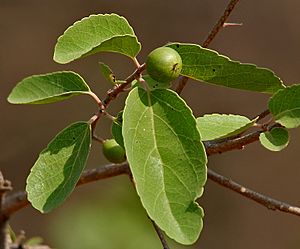Flacourtia indica facts for kids
Quick facts for kids Flacourtia indica |
|
|---|---|
 |
|
| Scientific classification |
|
| Kingdom: | Plantae |
| Clade: | Tracheophytes |
| Clade: | Angiosperms |
| Clade: | Eudicots |
| Clade: | Rosids |
| Order: | Malpighiales |
| Family: | Salicaceae |
| Genus: | Flacourtia |
| Species: |
F. indica
|
| Binomial name | |
| Flacourtia indica (Burm.f.) Merr.
|
|
| Script error: The function "autoWithCaption" does not exist. | |
| Synonyms | |
|
Flacourtia ramontchi |
|
Script error: No such module "Check for conflicting parameters".
Flacourtia indica, also known as ramontchi, governor's plum, Madagascar plum, or Indian plum, is a type of flowering plant. It grows naturally in many parts of Africa and in warm and mild areas of Asia. Sometimes, F. indica and F. ramontchi are thought of as different kinds of plants.
Contents
About the Ramontchi Plant
This plant can grow as a bushy shrub or a tree. It has a spiny trunk and branches. As a shrub, it can reach about 7.6 meters (25 feet) tall. As a tree, it can grow up to 15 meters (50 feet) high. Its branches hang down and have oval-shaped leaves.
The plant has thorns, much like a lemon or lime tree. These thorns can be prickly if you touch them. Birds help spread the seeds of the ramontchi plant.
Uses of Ramontchi
The Fruit
The ramontchi fruit is about 2.5 centimeters (1 inch) wide. It starts red and turns purple when it ripens. The fruit is very juicy and has 6 to 10 seeds inside. The soft part of the fruit, called the pulp, is yellow or white. It tastes sweet with a bit of a sour kick.
People enjoy eating the fruit fresh. It can also be made into jelly or jam. Some people even use it to make wine.
Traditional Uses
Different parts of the ramontchi plant have been used in traditional medicine. For example, the leaves and roots were used to help with snakebites. The bark was thought to be helpful for arthritis.
Many parts of the plant were also used for common problems. These include helping with a cough, pneumonia, and throat infections. It has also been used to treat diarrhea.
Other Uses
The ramontchi tree is sometimes planted to create a living fence. In India, it was once used as part of a special border called the Inland Customs Line. The wood from the tree is good for firewood. It is also used to make small wooden tools, like handles for plows.
Where Ramontchi Grows
The ramontchi plant is sometimes grown in new places. In some areas, it can become an invasive species. This means it grows very well and can spread quickly, sometimes taking over where other plants grow. For example, it has been grown in Florida in the United States. Today, it can be found growing wild there.
See also
 In Spanish: Ramontchi para niños
In Spanish: Ramontchi para niños
 | Emma Amos |
 | Edward Mitchell Bannister |
 | Larry D. Alexander |
 | Ernie Barnes |

